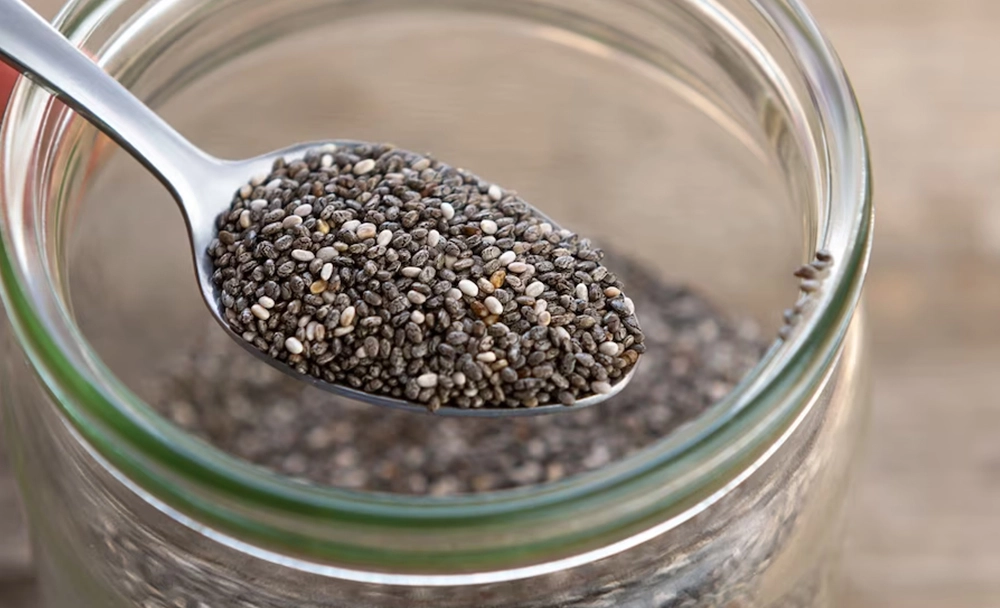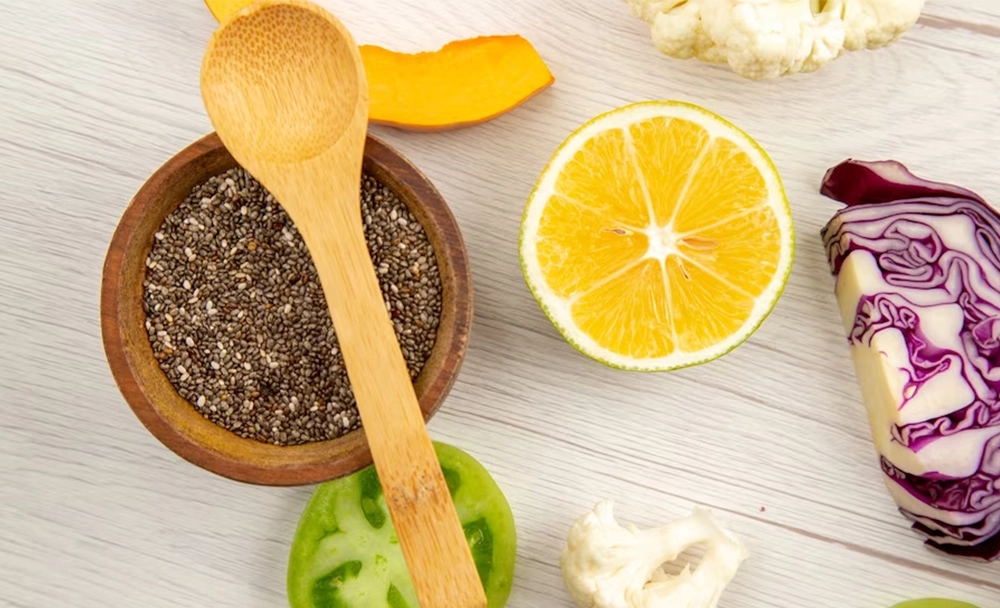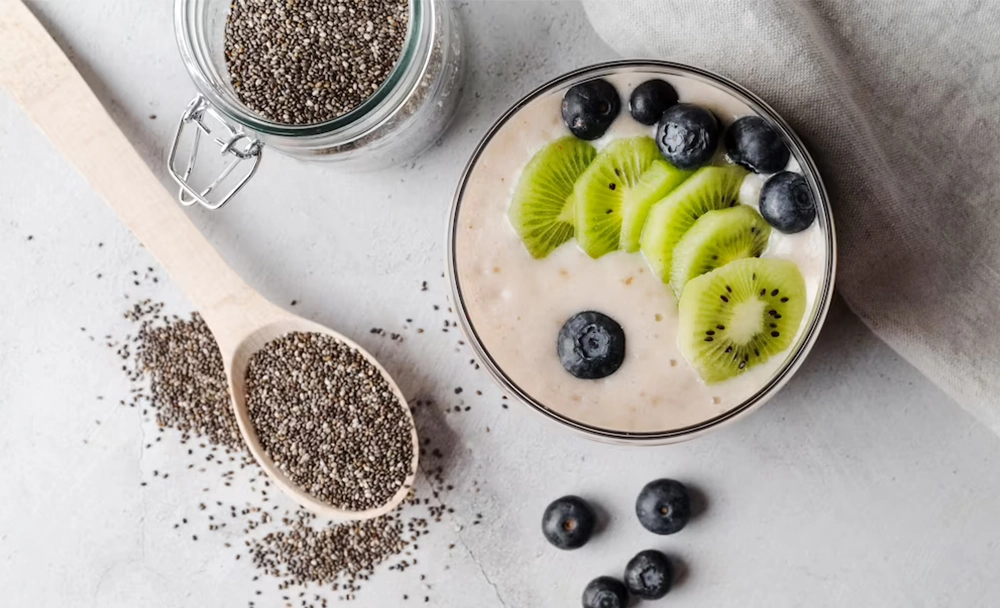This article is reviewed by an expert

Chia seeds are tiny black or white seeds that come from a plant called Salvia Hispanica, which is native to Mexico and Guatemala. They have been embraced by Indians and are now a popular ingredient in many Indian health foods because of their taste as well as their health benefits. These seeds are rich in nutrients, antioxidants and omega-3 fatty acids, making them a good addition to any healthy diet.
Chia Seeds Nutrition
A single serving of chia seeds would be 2.5 tablespoons or 28 grams. This may not sound like much, but it packs quite a punch with its high content of vitamins, minerals, antioxidants and omega-3 fatty acids. A single serving provides you with [1] :
- 11 grams of fibre
- 4 grams of protein
- 9 grams of fat (mostly omega-3s)
- 13% of the daily value (DV) of calcium
- 13% of the daily value (DV) of iron
Health Benefits Of Chia Seeds

Promotes Heart Health
Primary Benefits: Chia seeds are a good source of omega-3 fatty acids, especially alpha-linolenic acid (ALA), which can lower blood pressure, cholesterol, and triglycerides. Omega-3s may also reduce inflammation and improve blood vessel function. A low ratio of omega-6 to omega-3 fatty acids is associated with a lower risk of cardiovascular disease. Chia seeds can help achieve this ratio by providing more omega-3s than omega-6s [2,3].
Blood Sugar Control
Primary Benefits: May improve blood sugar levels. Chia seeds are high in fibre, which can slow down the digestion and absorption of carbohydrates, preventing fluctuations in blood sugar levels. Fibre may also improve insulin sensitivity and lower the risk of type 2 diabetes. Studies have shown that chia seeds can reduce postprandial blood glucose and insulin responses when added to bread or beverages [4] .
Protects Against Free Radical Damage
Primary Benefits: Chia seeds contain various antioxidants that can protect the cells from oxidative stress and inflammation. Some of these antioxidants are caffeic acid, chlorogenic acid, kaempferol, and quercetin [5]. Antioxidants may help prevent or reduce the risk of chronic diseases such as heart disease, cancer, and diabetes. They are also responsible for chia seeds benefits for skin as they protect against age-related damage. Likewise, chia seeds benefits for hair are attributed to the high antioxidant and nutrition of the seeds.
Helps in Weight Management
Secondary Benefits: The use of chia seeds for weight loss has become increasingly popular as they can increase satiety and reduce cravings. The fibre in chia seeds absorbs water and forms a gel-like substance in the stomach, which can make you feel full for longer. The protein in chia seeds can also suppress hunger hormones and boost metabolism. A study confirmed chia seeds benefits for weight loss, showing that their regular consumption reduces body weight and waist circumference within 12 weeks [6].
Strengthens Bone Health
Secondary Benefits: Chia seeds are a good source of calcium, magnesium, phosphorus, and manganese, which are essential for bone formation and maintenance. Chia seeds also contain boron, a trace mineral that helps the body use calcium and magnesium more efficiently. Eating chia seeds regularly may help prevent osteoporosis and fractures [7].
How To Consume Chia Seeds

Chia seeds can be used in various ways, such as soaking, sprinkling, grinding, or mixing them with different foods and liquids. They can be prepared as chia pudding, chia jam, chia mousse, chia gel, or chia oats with milk, fruit juices, or sauces. They can also be added to smoothies, cereal, yogurt, soup, muffins, or gravies for extra texture and nutrients. Chia seeds can act as a thickener, an egg replacer, or a breadcrumb swap in some recipes. Chia seeds can be digested whole or ground, but they form a gel when absorbing liquid.
Conclusion
Chia seeds are a nutritious and versatile food that can offer many health benefits. They can be easily incorporated into various dishes and recipes to enhance their flavour and texture. However, suddenly adding a large quantity of the seeds to your diet can be counterproductive and won’t increase chia seeds’ benefits. Stick to a small serving size and make sure to first check with your doctor if you suffer from any pre-existing health condition.
Disclaimer: This article is written from a modern health and lifestyle perspective. There is no relevance to Ayurveda.
References:
- https://fdc.nal.usda.gov/fdc-app.html#/food-details/541939/nutrients
- https://www.ncbi.nlm.nih.gov/pmc/articles/PMC6357022/
- https://www.ncbi.nlm.nih.gov/pmc/articles/PMC4808858/
- https://www.nature.com/articles/ejcn2013103
- https://www.ncbi.nlm.nih.gov/pmc/articles/PMC6627181/
- http://www.aulamedica.es/nh/pdf/8242.pdf
- https://www.ncbi.nlm.nih.gov/pmc/articles/PMC6073254/


















